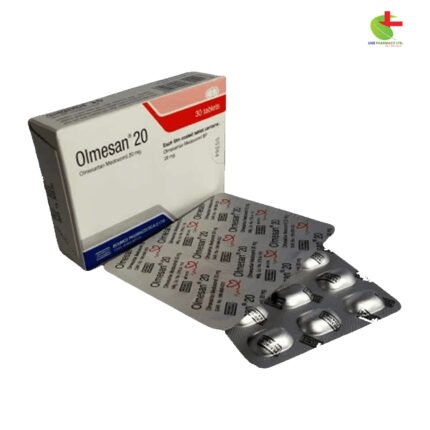Onsat 8
100.00৳ Strip
- Onsat is an antiemetic used to prevent and treat nausea and vomiting from chemotherapy, radiotherapy, and postoperative procedures.
- It comes as a quick-dissolving oral film that works by blocking serotonin 5-HT3 receptors.
- Suitable for adults and children, with dosage tailored to specific treatment and patient needs.
- Caution is advised during pregnancy and lactation.
 Brand
Brand
|
Beximco Pharmaceuticals Ltd |
|---|---|
 Generics
Generics
|
Ondansetron |
 Type
Type
|
Tablet |
Indications
Onsat is a serotonin 5-HT3 receptor antagonist used for preventing nausea and vomiting associated with emetogenic cancer chemotherapy, radiotherapy, and post-operative procedures. It can be used alone or in combination with other treatments.
Description
Onsat is an oral soluble film designed to dissolve on the tongue within 20 seconds, making it easy to swallow without water. The film contains Onsat base, which is a selective 5-HT3 receptor antagonist.
Pharmacology
Onsat works by blocking 5-HT3 receptors, which helps control nausea and vomiting caused by chemotherapy, radiotherapy, and post-operative conditions. Its action involves both peripheral and central mechanisms.
Dosage
For chemotherapy-induced nausea and vomiting, adults and pediatric patients (6 months to 18 years) typically receive 8 mg or 4 mg doses in three 0.15 mg/kg doses, up to a maximum of 16 mg per dose. For radiotherapy-induced nausea and vomiting, adults take 8 mg orally 1-2 hours before radiotherapy, followed by 8 mg every 8 hours for up to 5 days post-treatment. For postoperative nausea and vomiting, adults are given 16 mg as two 8 mg films or 4 mg via injection 1 hour before anesthesia. Pediatric dosing varies, with injections used for those over 40 kg.
Administration
For oral soluble film, tear open the pouch, place the film on the tongue, let it dissolve within 20 seconds, and then swallow with or without liquid. Wash hands after use.
Interaction
Onsat does not induce or inhibit the cytochrome P-450 enzyme system but is metabolized by it. No dosage adjustment is needed for drugs that affect these enzymes.
Contraindications
Onsat is contraindicated in patients with hypersensitivity to the drug or its components and should not be used with apomorphine.
Side Effects
Common side effects include headache, constipation, and diarrhea, which are generally mild to moderate. Rare side effects may include anaphylaxis, bronchospasm, and tachycardia.
Pregnancy & Lactation
Onsat has not shown carcinogenic effects in animal studies and is not mutagenic. However, it is excreted in rat breast milk, so caution is advised during pregnancy and lactation.
Precautions & Warnings
Onsat should not replace nasogastric suction and may mask gastrointestinal issues in some patients.
Use in Special Populations
No dosage adjustment is needed for patients with impaired renal function or those over 65. In patients with severe hepatic impairment, a single 8 mg dose infused over 15 minutes is recommended. There is limited data on dosage for children under 4 years.
Therapeutic Class
Anti-emetic drugs
Storage Conditions
Store at temperatures below 30ºC, in a dry place, protected from light and moisture.













Reviews
There are no reviews yet.